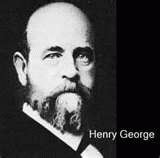Henry George defined Labor as simply all mental and physical effort used in production. And, in George's political economy, production is defined as all the processes involved in making wealth and bringing it from its place of origin to the consumer. It should go without saying that the only production that counts is that which satisfies consumer. As a counter-example, I may expend hours of labor whittling away a wooden toy car, but if there is no consumer willing to pay me for it, my labor is said to have no economic value.
So, let us confine ourselves to labor that has clear economic value when comparing conditions of Labor in Henry George's time to our own.
Labor conditions were indeed often appalling in the nineteenth century, but are they any better now? Let's start with a specific example and broaden our findings from there.
In "Social Problems," George talks about tailors in New York City who are able to find employment only part of the year and have to "beg, steal or starve" the rest [1], or rely on a "charitable society." Certainly, the tailors of today, unless they out and out fail in business, and probably not even then, do not alternate between being profitably employed and begging, stealing or starving, so this is progress, right? But, wait a minute. In addition to mending my clothes, my neighborhood tailor also dry cleans them in fact, dry cleaning is now such a large part of their business that they are known chiefly by that title: Dry Cleaner, and tailoring is only a secondary line of work for them. In our modern society, we outsource our clothes-cleaning (now both more frequent and more complicated than in George's day of simpler garments), and occasional mending. This at least provides consistent employment for tailors, and a wider range of skill development (I don't know how to use Dry Cleaning chemicals to clean my clothes, do you?). So, onward and upward! As his customers benefit, so does the tailor"or does he?
There is something the tailor is definitely not doing much of these days, unless he is very skilled and his customer very rich, and choosy, and that is making clothes out of whole cloth. Here is a list of Tailor-related jobs from the 1891 London Census:[2]
Tailor
Someone who made or repaired clothes
Tailor & Clothier
Someone who made or repaired clothes.
Tailor Coat Hand
A tailor's assistant.
Tailor Hand
A tailor's assistant
Next Page 1 | 2 | 3 | 4 | 5 | 6 | 7 | 8 | 9
(Note: You can view every article as one long page if you sign up as an Advocate Member, or higher).






